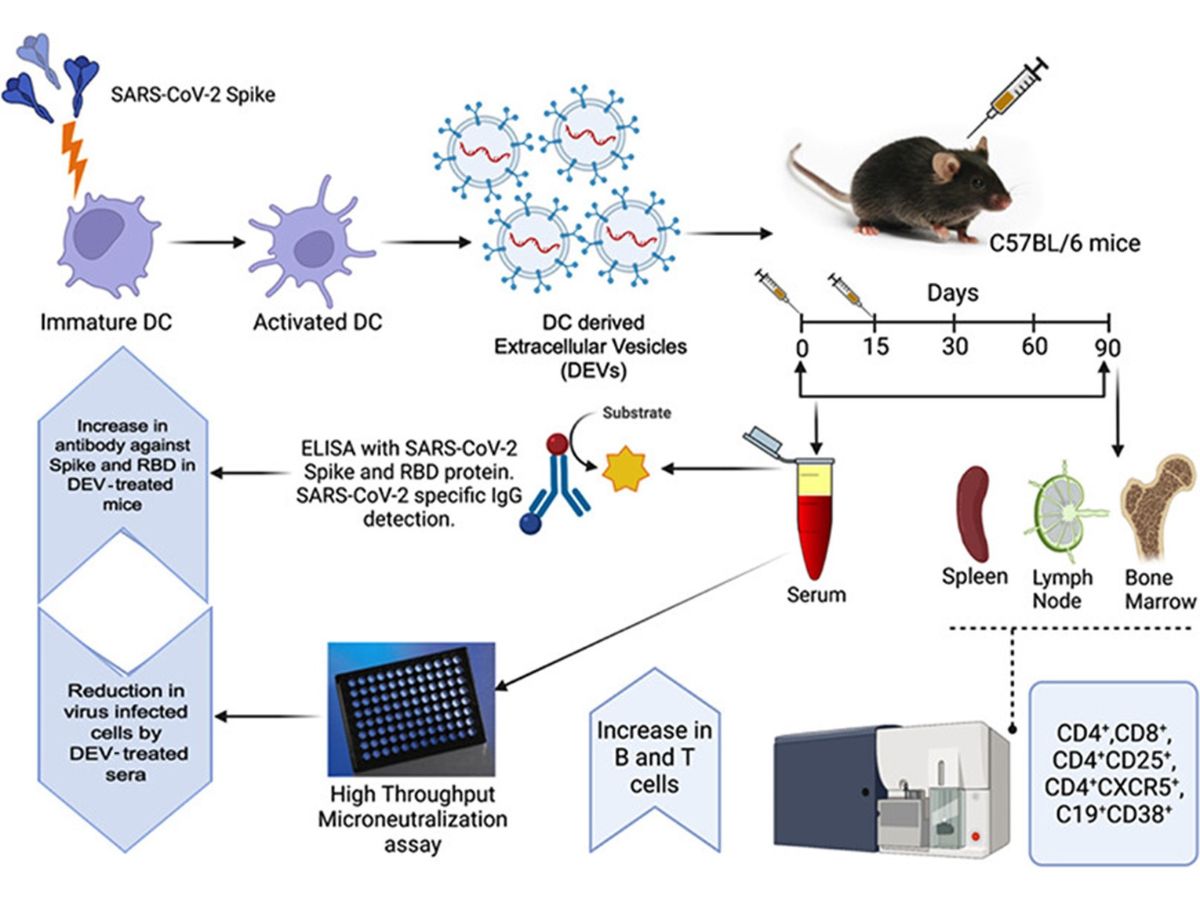Next-Gen Covid-19 Vaccine Developed By IIT Delhi Using Immune Cells Can Reduce Blood Clotting: Study
The new Covid-19 vaccine developed by IIT Delhi, which is a nano-vaccine, can overcome the disadvantages of existing vaccines, and also prevent blood clotting, and provide a durable immune response.

Researchers from Indian Institute of Technology (IIT) Delhi have developed a next-generation Covid-19 vaccine which can overcome some disadvantages associated with existing vaccines. The drawbacks of existing Covid-19 vaccines include reduced stability of the materials used to make the vaccine, limited immune response, and side effects such as blood clotting.
However, the new Covid-19 vaccine developed by IIT Delhi, which is a nano-vaccine, can overcome these disadvantages, and also prevent blood clotting, provide a durable immune response, and hence, offer better protection from the deadly Covid-19 virus, according to a new study.
The study describing the naturally derived nano-vaccine was recently published in the journal ACS Biomaterials Science and Engineering.
What is a nanoparticle-based vaccine?
A nanoparticle-based or nano vaccine is one in which the receptor-binding domain (RBD), a part of the spike protein of SARS-CoV-2, is attached to a protein designed to form nanometre-sized protein particles, or nanoparticles, according to a study conducted by the US National Institutes of Health (NIH), published in the journal Nature. SARS-CoV-2 attaches itself to cells using the spike protein.
What is a receptor-binding domain?
RBD is a short immunogenic fragment from any virus that binds to a specific receptor sequence to gain entry into host cells. The fact that RBD is immunogenic means that it can generate an immune response.
What are adenovirus-based vaccines?
Currently used vaccines use synthetic materials or adenovirus to package and deliver antigens. Adenovirus-based vaccines are the ones in which a modified version of a chimpanzee adenovirus called ChAdOx1 is used so that it can enter the cells of a human or another host but not replicate inside. An adenovirus is a type of virus that causes respiratory illnesses.
How was the new vaccine developed?
The next-generation vaccine has been developed using immune cells. One of the advantages of the nano-vaccine over currently approved vaccines is that it will minimise the chance of blood clotting, which is otherwise observed in vaccinated individuals, according to the study.
The study was carried out in collaboration with the Regional Centre for Biotechnology.
How is the new vaccine better than existing vaccines?
After vaccination, antigens, or agents foreign to the host, are processed by antigen-presenting cells (APCs). The APCs eventually activate other immune cells such as B and T cells to generate the antibodies and eliminate the virus.
However, the newly developed vaccine is one step ahead because it uses the nano-vesicles derived from activated APCs to directly activate B and T cells. The nano-vesicles derived from activated APCs already contain processed antigens on their surface and are equipped with other factors required for the direct activation of B and T cells.
How the new vaccine works

The researchers attached the spike protein of SARS-CoV-2 to immature dendritic cells, a type of antigen-presenting cell. A dendritic cell is a special type of cell that is found in tissues, such as the skin, and boosts immune responses by showing antigens on its surface to other cells of the immune system, according to NIH.
Due to the introduction of the spike protein to dendritic cells, they became activated. Then, the researchers obtained dendritic cell-derived extracellular vesicles. These already contained processed antigens on their surface.
The researchers created nano-vesicles and injected them into mice at intervals of 15 days, for three months.
Then, they conducted enzyme-linked immunosorbent assay (ELISA) of serum obtained from the mice. ELISA is an immunological assay commonly used to measure antibodies, antigens or proteins.
The mice had been injected with SARS-CoV-2 spike protein and RBD protein. The researchers detected SARS-CoV-2 specific IgG (Immunoglobulin G) in the serum of the mice.
Significance of the study
The study concluded that the vaccine resulted in an increase in antibodies against spike protein and RBD protein. Also, sera treated with dendritic cell-derived extracellular vesicles resulted in a decrease in SARS-CoV-2-infected cells.
The vaccine resulted in an increase in B and T cells.
In a statement released by IIT Delhi, Professor Jayanta Bhattacharyya, one of the authors on the paper, said when injected with a 10 times lower dose compared to the free antigen, the nano-vaccine was equally efficient in raising antiviral immunity. He added that the vaccine showed a durable immune response, including the generation of memory cells, which can act as a safeguard for the next infection.
Bhattacharyya also said that the approach to vaccination can be used for various other infectious diseases, such as dengue, and the Indian Council for Medical Research (ICMR) has approved a research grant to the group for the development of a nano-vaccine against dengue.
Therefore, the study concluded that the vaccine generated antibodies against Covid-19, and was more effective as compared to vaccines that introduce free antigens to the body of a host organism.
Check out below Health Tools-
Calculate Your Body Mass Index ( BMI )
Calculate The Age Through Age Calculator







































